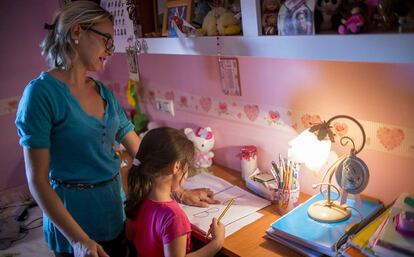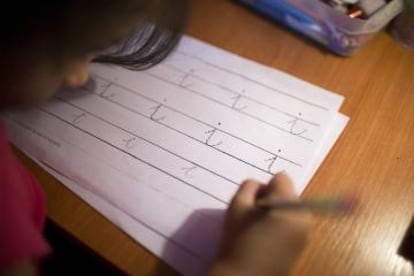Why are Spanish infants doing 10 hours of homework a week?
Schools are sending five-year-olds home with more and more tasks: now, parents are protesting

Alberto takes his homework everywhere. The five-year-old even takes it to his grandmother’s house at the weekend for the family lunch in a bid to complete it over the weekend. His mother, Reyes, is worried, saying the school “really pushes” the children. Alberto is in the last year of infant school and he spends an hour-and-a-half every afternoon filling out cards with the alphabet in capital letters. His school, a state-run center in Seville, is not unusual, according to his mother who tried to move him to another, only to find that the alternatives were no better. Neither did she find solace in other parents’ views. “They didn’t think it was a bad thing,” says Reyes. “They get their children used to the idea of competition from an early age.”
This divide between those who want their children to have homework and those who would prefer it to be given at a later stage is part of the debate currently raging in Spain that has led the state-school parents’ confederation (CEAPA) to call for a homework boycott in November.
We need homework that takes into account the individual Pedro Caballero, CONCAPA
At El Vetón state school in Majada de Tiétar, in the western province of Caceres, some parents request homework for their five-year-olds. “They think it’s like sport,” says Jorge Torres, one of the school’s more experienced teachers. “If I run everyday, I’ll win the marathon. But it’s not like that. Each child matures at his own pace. If the child asks for reading tools, they should be given them, but not automatically.”
Almudena, another five-year-old, sighs when the weekend comes, bringing with it the alphabet cards. She is on the letter “I.” Her mother, María José, doesn’t think the homework is excessive but she does say her daughter is not keen to do it. “We tackle it together on Sunday mornings,” she says.
What does worry her is her other daughter, Ana María, aged 11, who has just started secondary school in Seville after spending the last two years “without a break from her homework until dinner time.”
It’s more than a year since the debate over the benefits of homework kicked off in Spain. In 2015, mother of three Eva Bailén began to collect signatures for a petition demanding a reduction in homework after watching her middle child lose out on the chance to play throughout his childhood. Her campaign is ongoing and has triggered attempts throughout the country to regulate homework. Almost simultaneously, the CEAPA, comprised of 12,000 parents’ associations, began to demand that homework disappear altogether from their children’s lives.
To be given homework before starting primary school, as in the case of Alberto and Almudena, is not the norm in Spain. But complaints have alerted CEAPA to the fact that some infant schools are pushing their pupils to master reading and writing as early as possible, instead of respecting their natural way of learning through play, says CEAPA president José Luis Pazos. Data from a survey of 1,748 families shows that 6.84% of infant school parents estimate their children have an hour of homework a day.

The debate is, however, largely centered on the primary school years – overlapping with secondary, when it is not uncommon for children, like María José’s daughter, to have their heads down all afternoon, every afternoon.
“If the authorities gave simple guidelines based on dialogue with parents and teachers, much of the tendency to overload could be avoided,” says Carlos Utrera, President of Adide, the Association of School Inspectors. He believes that homework is important for “consolidating what has been learned while respecting the age of the child” – a maximum of 30 minutes a day during the early primary years, 40 minutes in the later primary years and up to an hour in secondary. During his school visits, he suggests that teachers reserve a space on the blackboard for the homework they want to set each day. That way, the next teacher who comes in can see what the children have already been given and can adapt their tasks accordingly.
In Sagrada Familia, a government-subsidized school in Madrid, a similar strategy has been in place since last year. Teachers do not give homework at infant level and very little in the first years of primary. Moreover, the teachers decide together what and how much will be set, according to Cecilia Egido, the school’s educational coordinator. “We want to give a say and a role to the families,” she says. That means that the parents themselves can decide whether it is better for their children to calculate on a piece of paper at home or take them to the supermarket and have them do sums there. Egido is also in favor of learning through play. “Children need time to get bored and develop their imagination,” she says. “And we don’t let them have it.”
According to a 2012 study by the Organisation for Economic Cooperation and Development (OECD), Spanish 15-year-olds have more homework than their peers, with 6.5 hours a week compared to an average of 4.9, with state schools pushing up the Spanish median.
At the start of this school year, the issue broke onto the political agenda when acting education minister, Iñigo Méndez de Vigo, recognized that there was need for “reflection”, with the regional governments of Madrid, the Canary Islands and Murcia all approving recommendations to reduce homework time.
Now CEAPA plans a homework boycott. If teachers insist on setting homework during the boycott, children should refuse to do it, says the organization, and instead take an explanatory note to school, as in any other strike situation.
Spanish 15-year-olds have more homework than their EU peers
One mother, Diana, is already employing the note strategy with her eight-year-old daughter’s English teacher. “I sent a note saying that my daughter had been unable to finish her homework due to family issues and that I would appreciate it if it were not considered a problem,” she says. The eight-year-old, who attends a government-subsidized school in Alcalá de Henares, Madrid, is the oldest of three. She is in school from 8.40am until 2.10pm, then she has lunch and does homework from 4pm until 6.30pm.
“They are meant to give them the chance to work during school hours, but there’s no time,” says Diana. “When she finishes she still hasn’t begun her extra curricular activities so her day is even worse than an adult’s. When is she going to play?”
Every afternoon Diana talks about the homework to other mothers who all agree their children are being pushed too hard. Diana’s daughter was punished for not finishing her English homework. If they punish her again, she says she will ask for a meeting with the child’s teachers.
“These punishments are antiquated,” says Pedro José Caballero, President of the Parents’ Confederation for Government-subsidized Schools,CONCAPA, an umbrella organization for 2,000 schools and almost three million families. “They aren’t going to learn more like that.”
CONCAPA does not believe in giving homework during infancy but it does believe in homework for primary pupils. “We need sensible homework that takes into account the individual, because not all children learn at the same rate,” says Caballero. “The problem is that many families feel snowed under by homework. The parents end up doing it and the children have no time to do anything else.”
The Ministry of Education provided Spain’s North African exclave cities, Ceuta and Melilla, with the option of holding five- or six-year-olds back a year if they had “special needs,” as long as “it favors their social and educational integration.” The State School Advisory Board warned against this “at a very early stage,” noting: “In many cases learning problems can be corrected with the right support, including parental collaboration.” The suggestion was ignored.
English version by Heather Galloway.
Tu suscripción se está usando en otro dispositivo
¿Quieres añadir otro usuario a tu suscripción?
Si continúas leyendo en este dispositivo, no se podrá leer en el otro.
FlechaTu suscripción se está usando en otro dispositivo y solo puedes acceder a EL PAÍS desde un dispositivo a la vez.
Si quieres compartir tu cuenta, cambia tu suscripción a la modalidad Premium, así podrás añadir otro usuario. Cada uno accederá con su propia cuenta de email, lo que os permitirá personalizar vuestra experiencia en EL PAÍS.
¿Tienes una suscripción de empresa? Accede aquí para contratar más cuentas.
En el caso de no saber quién está usando tu cuenta, te recomendamos cambiar tu contraseña aquí.
Si decides continuar compartiendo tu cuenta, este mensaje se mostrará en tu dispositivo y en el de la otra persona que está usando tu cuenta de forma indefinida, afectando a tu experiencia de lectura. Puedes consultar aquí los términos y condiciones de la suscripción digital.









































